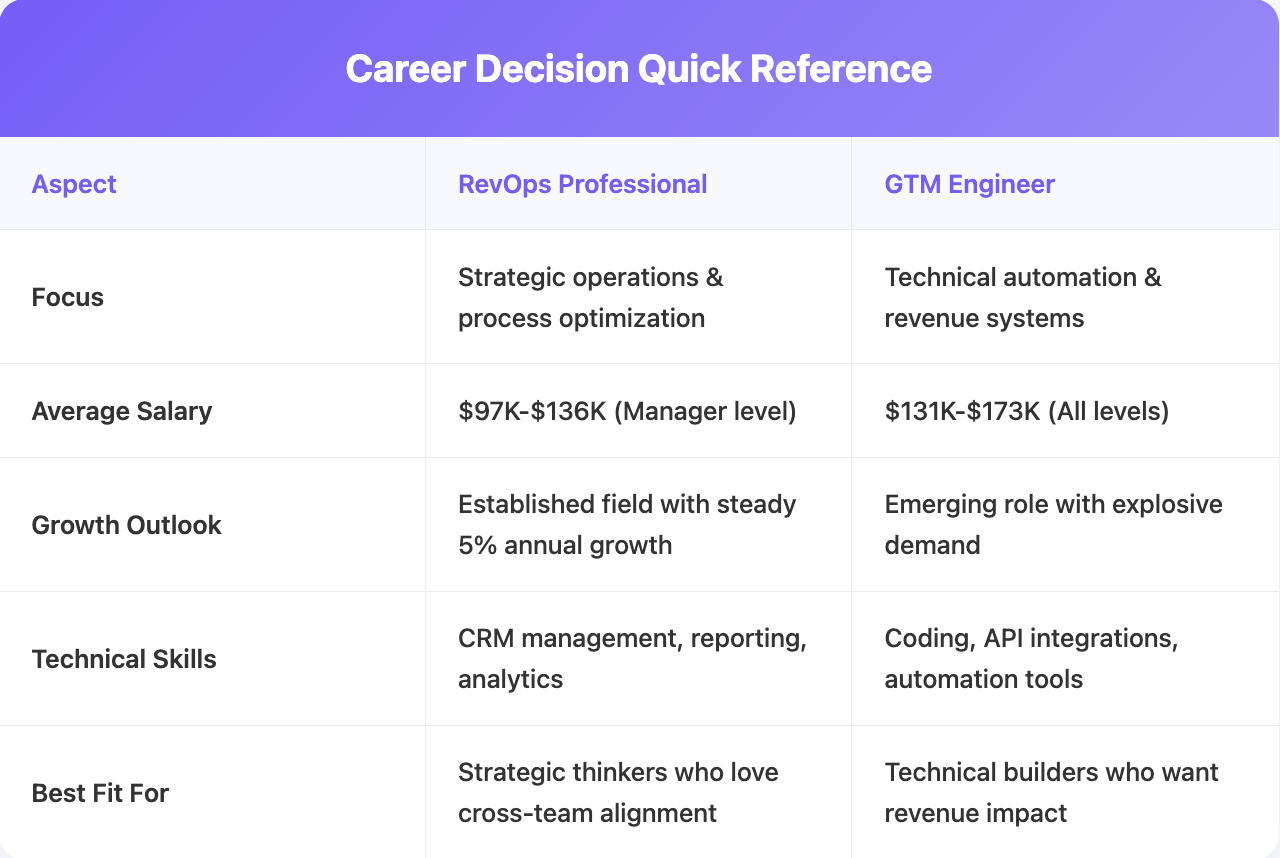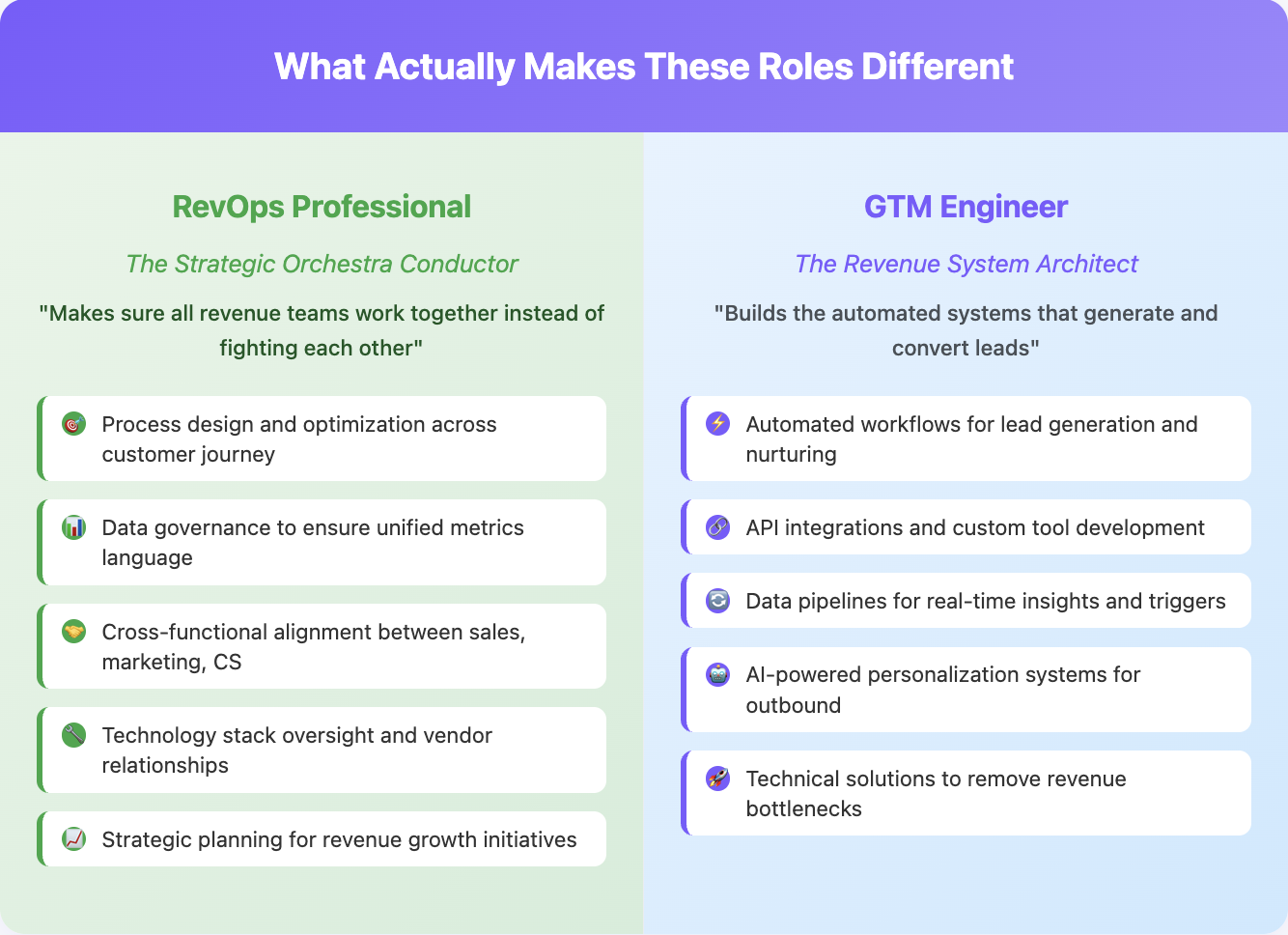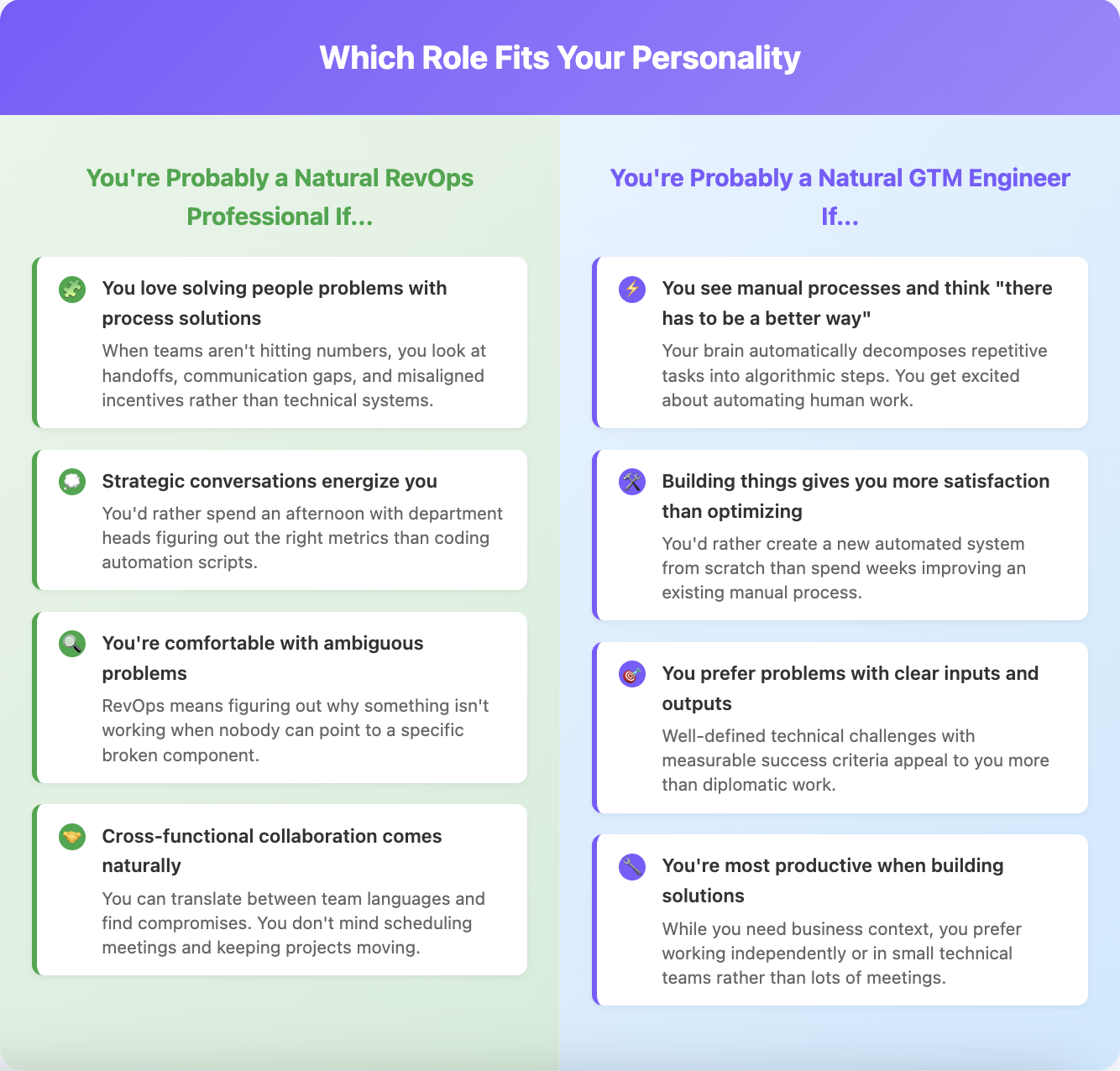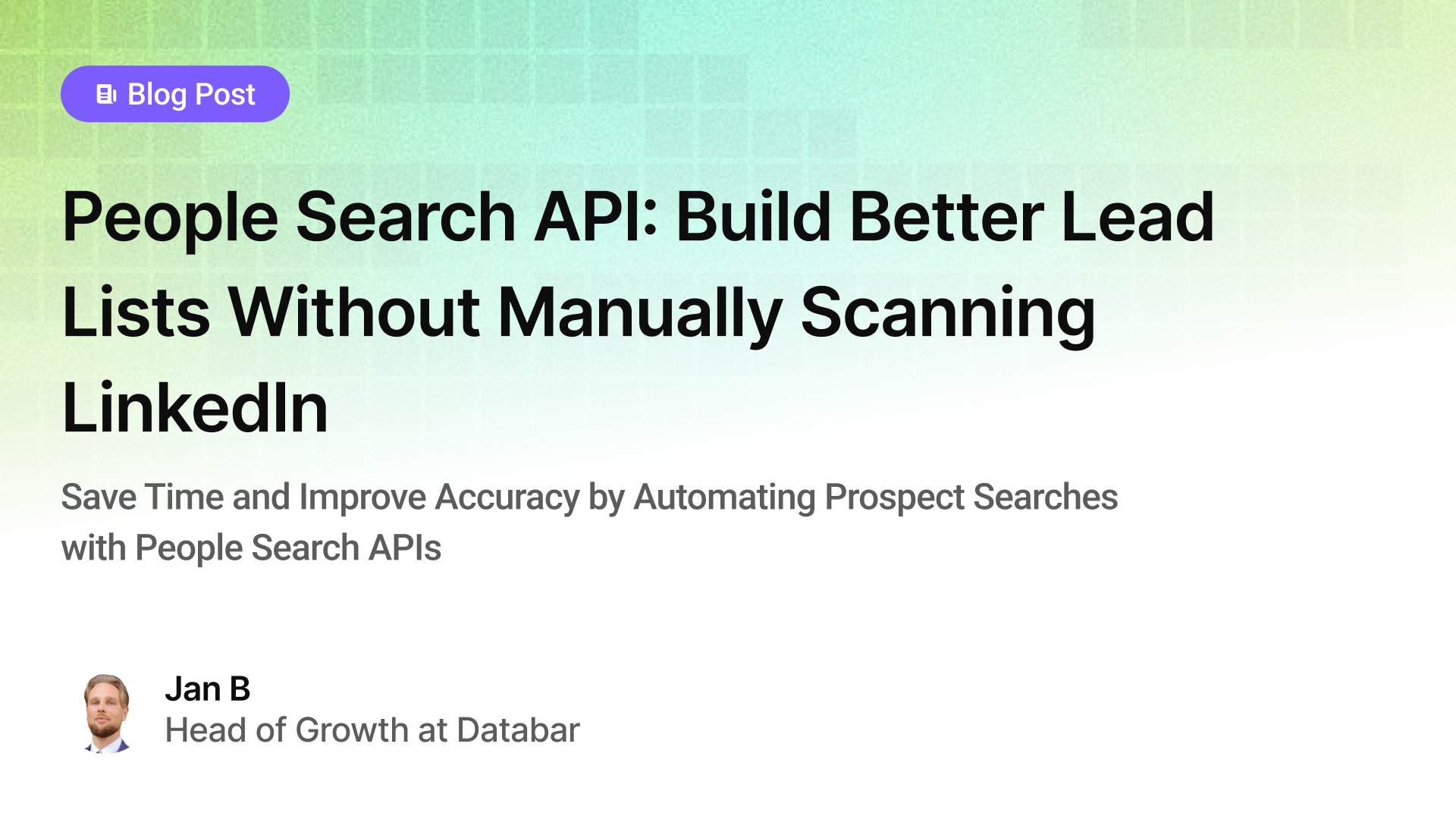RevOps vs GTM Engineering: Which Role Should You Choose?
Finding the Right Fit: Strategic RevOps or Technical GTM Engineering?
Blogby JanJuly 08, 2025

A career choice that's becoming increasingly common in the go-to-market world presents itself regularly: Should professionals pursue the established RevOps track or jump into the buzzy new GTM Engineering space? Many have the analytical chops for RevOps and the technical skills for GTM Engineering, but can't figure out which path will actually pay off.
Here's what matters: both roles are experiencing massive growth, but they're solving fundamentally different problems. According to industry data, RevOps roles see 36% more revenue growth for companies that invest in them, while GTM Engineers are becoming the technical backbone that automates and scales these operations.
The choice isn't just about salary (though GTM Engineers currently edge out RevOps on average). It's about understanding which type of revenue impact matches your strengths and career goals.

What Actually Makes These Roles Different?
The LinkedIn debates are everywhere. "GTM Engineer is just RevOps with Python skills!" or "RevOps people are glorified spreadsheet jockeys!" Both takes miss the point.
The real difference lies in where each role creates value in the revenue engine.
RevOps: The Strategic Orchestra Conductor
RevOps professionals are the strategic operators who make sure all revenue-generating teams work together instead of fighting each other. They align marketing, sales, and customer success teams with unified data, effective processes, and integrated tools.
Think of RevOps as the conductor of an orchestra. They don't play every instrument, but they make sure the violin section doesn't drown out the brass, and that everyone hits the crescendo at the same time.
These professionals focus on process design and optimization across the entire customer journey, data governance to ensure everyone speaks the same metrics language, and cross-functional alignment between sales, marketing, and customer success. They also manage technology stack oversight and vendor relationships while handling strategic planning for revenue growth initiatives.
RevOps managers earn an average of $97,749 annually, with senior roles commanding up to $136,000. The field is mature enough that career progression is well-defined, from analyst to specialist to manager to director roles.
GTM Engineers: The Revenue System Architects
GTM Engineers are the technical builders who create the automated systems that generate and convert leads. Unlike traditional sales or marketing operations, GTM Engineers don't just manage CRM hygiene or marketing workflows; they write scripts, integrate systems, build data pipelines, and develop custom automations to optimize and scale GTM functions.
If RevOps is the conductor, GTM Engineers are the ones who build the concert hall's sound system, automate the lighting, and create the digital tools that let musicians perform at their peak.
GTM Engineers help to orchestrate the GTM tech stack to turn strategy into execution by connecting tools, workflows, and data, and in doing so build automated systems that scale high-ROI activities. They focus on building automated workflows for lead generation and nurturing, creating API integrations and custom tool development, constructing data pipelines for real-time insights and triggers, implementing AI-powered personalization systems for outbound campaigns, and solving technical problems to remove revenue bottlenecks.
GTM Engineers command salaries ranging from $131,000 to $180,000+. The role is so new that career paths are still being defined, but early indicators suggest rapid progression opportunities.

Skills That Matter
Both roles require a unique hybrid of technical skills and business skills, but they weight them differently.
RevOps Skill Stack
RevOps takes a business-first, tech-enabled approach. You need strategic thinking and cross-functional communication as your foundation. RevOps teams need a mix of analytical, technical, and operational skills. These people are comfortable with data, understand business processes, and can work effectively with different departments.
Data analysis and reporting come next, but this means Tableau dashboards, not Python scripts. CRM expertise means you can configure Salesforce workflows and optimize HubSpot pipelines. Process design and workflow optimization round out the technical side, while project management across multiple stakeholders keeps everything moving forward.
You're the person who can talk to the CMO about pipeline conversion rates in the morning and then explain to the sales team why their lead routing needs to change in the afternoon. It's about understanding the business first and using technology to solve those problems.
GTM Engineering Skill Stack
GTM Engineers flip this equation. A successful GTM Engineer should possess a blend of technical and strategic skills, including expertise in CRM platforms like Salesforce, HubSpot, and Marketo, knowledge of marketing automation tools and data integration solutions, strong experience in building and maintaining sales and marketing data pipelines.
The technical foundation starts with programming skills in Python, JavaScript, and SQL. API integration and automation tools like N8N, Zapier and Make.com become your daily bread and butter. Data enrichment platforms such as Databar and Clay aren't just tools you use—they're platforms you master and customize.
AI tool implementation goes beyond knowing how to prompt ChatGPT. You're building custom workflows that use language models to personalize outreach at scale. Web scraping and data pipeline construction mean you can pull prospect information from anywhere and route it through your revenue engine automatically.
You're the person who can build a system that automatically identifies when a prospect changes jobs and triggers a personalized outreach sequence. The business context matters, but your value comes from what you can build.
Career Trajectories: What Actually Happens
The career progression in both fields looks dramatically different right now.
RevOps Career Path: Established Highway
RevOps has a clear, well-worn career progression that most professionals can map out years in advance.
RevOps Analysts start around $73,261 annually, focusing on data analysis and basic process optimization. From there, you move into RevOps Specialist or Manager roles earning $95K-$118K, where you take ownership of projects and coordinate between teams.
Senior RevOps Managers in North America reported earning an average annual salary of $118,097, handling strategic initiative leadership and more complex cross-functional challenges. Director of RevOps positions command $150K-$200K for department leadership and long-term planning responsibilities.
At the top, VP RevOps and Chief Revenue Officer roles reach $200K-$300K+ for executive revenue strategy. For comparison, individual contributors report a median OTE of $84,024, while VPs or SVPs earn $176,571.
The field is mature with established training programs, certifications from companies like HubSpot and Salesforce, and professional communities like RevOps Co-op. You know exactly what the next step looks like and how to get there.
GTM Engineering: The Wild West
GTM Engineering career paths are still being written in real-time. Currently, GTM Engineers sit somewhere between Sales Ops, RevOps, and Growth. Over time, they will likely become their own department, reporting directly to revenue leadership.
Most professionals start as individual contributor GTM Engineers earning $131K-$173K, building systems and solving automation challenges. Senior GTM Engineers handling complex project leadership can command $150K-$200K. Lead GTM Engineers focusing on team building and technical strategy reach $180K-$220K.
At the department level, Head of Growth or Revenue Engineering positions are hitting $200K-$300K+ as companies create entirely new organizational structures around this function.
Some become Heads of Growth or Directors of Revenue Operations, overseeing entire teams of analysts and ops specialists. Others prefer to remain hands-on, continuing to push the boundaries of automation. A few branch out as consultants, offering "GTM Engineering as a Service" to multiple clients.
The role is evolving so rapidly that some professionals are literally creating their own job descriptions as they go. Career paths are being defined in real-time, which means both uncertainty and massive opportunity for those willing to take the risk.
The Money Question: What Do These Roles Actually Pay?
Let's cut through the salary survey nonsense and look at real numbers that matter.
RevOps Compensation Reality
The median total on-target earnings (OTE) for RevOps professionals hit $129,155. But the range varies dramatically based on several factors that actually impact your paycheck.
Geography matters significantly. Tech hubs like San Francisco and New York see 20-30% premiums over national averages. Factors such as company size have a dramatic influence on revenue operations salary, with enterprise RevOps teams commanding packages nearly triple those of their counterparts in smaller companies.
Industry focus can boost your earning potential. SaaS and subscription businesses pay premium rates because their revenue models depend heavily on the operational excellence that RevOps provides. Variable compensation is becoming more common, with performance-based bonuses tied to specific revenue metrics. Equity participation through stock options is increasingly standard for senior roles.
The use of variable compensation in RevOps roles reflects a broader shift towards aligning individual performance with organizational goals. This means your success directly impacts your compensation, which can be either motivating or stressful depending on your personality.
GTM Engineering Pay Premium
GTM Engineers often command premium salaries. In larger U.S. tech hubs, total compensation can range from $100,000 to $180,000+ depending on experience and the scope of responsibilities. The role commands this premium for several concrete reasons.
First, there's a scarcity premium. Supply simply hasn't caught up with the explosive demand for people who can bridge technical automation with commercial results. Companies justify it because a skilled GTM Engineer can literally add millions to the pipeline.
Second, the direct revenue impact is measurable. Unlike some technical roles where business value can be abstract, GTM Engineers build systems that demonstrably increase conversion rates, reduce acquisition costs, and scale revenue generation. This clear ROI justifies higher compensation.
Third, the technical complexity creates a natural barrier to entry. The combination of coding skills and commercial acumen is genuinely rare in the job market. Most engineers don't understand sales processes well enough to build effective automation, and most sales operations people can't code sophisticated integrations.
Job Market Reality Check
The demand dynamics for these roles couldn't be more different, and understanding this helps you time your career moves.
RevOps: Steady Growth in Established Market
RevOps roles are booming, with the Head of Revenue Operations being one of the fastest-growing positions in the U.S. According to ZipRecruiter, there are over 174,000 job postings for RevOps roles. The market is mature but still growing steadily as more companies recognize the value of unified revenue operations.
Companies are expanding their RevOps teams rapidly, with nearly 60% having established their functions in the last two years. This means predictable hiring patterns and clear role definitions. You're competing with experienced professionals transitioning from sales operations, marketing operations, and business analytics roles.
The interview processes are well-established. Companies know what they're looking for and have standardized assessments for RevOps capabilities. There are multiple career tracks you can pursue, whether you prefer analytics-focused roles, operations-focused positions, or strategy-focused leadership tracks.
GTM Engineering: Land Grab Opportunity
Companies like Affirm, AWS, Atlassian, BofA, Chainlink Labs, Coda, Grammarly, Nike, OpenAI, Prefect, Salesforce, ServiceNow, Snowflake, Snyk, Workday, and mParticle are rapidly building GTM Engineering teams. Certified GTM Engineers are in high demand, with companies like Salesforce, Apollo, and SEMrush actively hiring for these hybrid roles.
This creates a first-mover advantage for career progression. Companies are willing to train technical people on business context or business people on technical skills, as long as you show aptitude for both sides. Role definitions are flexible, which means you can often shape the position to match your strengths and interests.
The high risk/high reward nature of the field means the area could either consolidate into a standard operations role or explode into an entirely new professional discipline. Early signals suggest the latter, but there's no guarantee.
Which Role Fits Your Personality?
The technical requirements are just the entry ticket. The real determining factor is how you like to create impact and solve problems.
You're Probably a Natural RevOps Professional If... You love solving people problems with process solutions. When teams aren't hitting their numbers, your first instinct is to look at handoffs, communication gaps, and misaligned incentives rather than diving into the technical systems. You see organizational challenges as puzzles to solve through better coordination.
Strategic conversations energize you rather than drain you. You'd rather spend an afternoon in a conference room with department heads figuring out the right metrics to track than spend that same time coding up an automation script. The big picture thinking and cross-functional negotiation feels like the valuable work.
You're comfortable with ambiguous problems where the solution isn't obvious. RevOps often means figuring out why something isn't working when nobody can point to a specific broken component. The detective work of diagnosing organizational dysfunction appeals to you.
Cross-functional collaboration comes naturally. You can translate between different team languages and find compromises that everyone can live with. You don't mind being the person who schedules the meetings, follows up on action items, and keeps projects moving forward.

You're Probably a Natural GTM Engineer If... You see manual processes and immediately think "there has to be a better way." Your brain automatically starts decomposing repetitive tasks into algorithmic steps. You get genuinely excited about the possibility of automating something that humans currently do by hand.
Building things gives you more satisfaction than optimizing existing things. You'd rather create a new automated system from scratch than spend weeks improving an existing manual process. The creative aspect of engineering solutions appeals to you more than the diplomatic work of process improvement.
You prefer problems with clear inputs and outputs. GTM Engineering often involves well-defined technical challenges with measurable success criteria. You like knowing whether your solution worked or didn't work based on concrete metrics rather than subjective feedback.
You're most productive when you can focus deeply on building solutions. While you need to understand business context and occasionally present your work to stakeholders, you prefer working independently or in small technical teams rather than spending lots of time in cross-functional meetings.
Tools of the Trade: What You'll Actually Use
The day-to-day reality of these roles involves very different software, platforms, and types of problem-solving.
RevOps Professional Toolkit
Your daily work revolves around platforms that help you understand, measure, and optimize business processes. CRM systems like Salesforce and HubSpot become your primary workspace, where you're not just using them but configuring workflows, building custom fields, and optimizing user experiences for different teams.
For comprehensive CRM optimization strategies, explore our guide on best CRM enrichment tools that move the revenue needle.
Analytics platforms such as Tableau and Looker are where you spend significant time creating reports that actually matter to business decisions. You're not just pulling data—you're crafting narratives that help executives understand what's working and what isn't.
Marketing automation platforms like Marketo and Pardot require you to understand both the technical capabilities and the business logic behind campaign flows. You're the bridge between what marketers want to accomplish and what the technology can actually deliver.
Communication and project management tools like Slack and Asana become essential because so much of your value comes from coordinating between teams and keeping initiatives moving forward. You're often the person keeping track of who needs to do what by when.
GTM Engineer Toolkit
Your technical stack spans from data collection to analysis to automation. Data enrichment platforms like Databar and Clay aren't just tools you use—they're platforms you master and extend through custom integrations.
Programming languages, particularly Python, JavaScript, and SQL, form your foundation for building custom solutions that don't exist in off-the-shelf software. You're writing scripts that pull data from multiple sources, transform it according to business logic, and push it to the right systems automatically.
Creative Tool Mastery (Datbar and Clay): Automating data enrichment and lead sourcing at scale.
Web Scraping Expertise: Using tools like Serper.dev, ZenRows, and ScrapeLI to extract high-value prospect data.
API Integration & Automation: Building workflows that sync CRMs, enrichment tools, and outreach sequences.
AI tools have become central to the role, but not in the way most people think. You're not just prompting ChatGPT for content ideas. LLM-Powered Personalization: Leveraging AI tools to create scalable yet hyper-personalized outreach means building systems that use language models to generate customized messages based on prospect data automatically.
Automation platforms like N8N, Zapier and Make.com serve as the connective tissue between all these different systems.
Future Outlook: Where These Roles Are Headed
The future of RevOps is leaning towards automation and AI integration. Emerging roles include AI Operations Specialists and Revenue Intelligence Managers. RevOps professionals who adapt will become more strategic, focusing on decision-making while AI handles routine analysis and reporting.
Predictive analytics is becoming standard for forecasting and planning rather than just historical reporting. AI-powered insights are replacing manual report generation, which means RevOps professionals need to get comfortable interpreting machine-generated analysis rather than creating it from scratch.
The industry is shifting towards integrated revenue systems, predictive analytics, and customer lifetime value focus. This shift means RevOps professionals will need to think more like data scientists and less like traditional operations managers.
Customer lifetime value optimization is replacing traditional pipeline metrics as the primary focus. This requires RevOps professionals to understand not just how to acquire customers, but how to expand and retain them over longer time horizons.
And what’s next for GTM Engineers?
AI-Powered GTM Workflows: As AI advances, GTM Engineers will be responsible for integrating LLMs into sales workflows, dynamically personalizing outreach, and automating customer interactions in a way that still feels human.
Real-time revenue optimization through automated testing will become standard. GTM Engineers will build systems that continuously experiment with different approaches and automatically optimize for better results without human intervention.
Advanced integration platforms that go beyond current no-code tools are already emerging. GTM Engineers will work with more sophisticated automation infrastructure that can handle complex business logic and multi-step workflows.
More Defined Career Pathways: Right now, the GTM Engineer role is still being defined. In the future, there may be dedicated career paths leading from SDR, Growth, or RevOps into GTM Engineering, with specialized training programs and certifications.
Revenue engineering teams as standard organizational structure means GTM Engineers won't be individual contributors forever. They'll build and lead technical teams focused specifically on revenue system architecture and optimization.
Making the Decision: Your Next Steps
Here's how to actually choose between these paths based on real experience rather than theoretical appeal.
For RevOps consideration, shadow a RevOps professional for a day if possible, or at least schedule informational interviews with people in the field. Take on a cross-functional project at your current company to see how you like coordinating between teams with different priorities and communication styles.
Complete a HubSpot or Salesforce certification to gauge your interest in CRM optimization and business process design. Join RevOps communities like RevOps Co-op to understand the culture and see if the types of challenges they discuss energize you.
For GTM Engineering consideration, build something automated using Zapier or write a simple Python script that solves a business problem. The goal isn't to become an expert immediately, but to see whether the building process feels satisfying or frustrating.
Complete a Clay or Apollo tutorial to understand data enrichment workflows and see if the technical problem-solving appeals to you. Join GTM engineering communities and study real automation examples to understand what the day-to-day work actually involves.
For advanced data enrichment strategies that both roles need to understand, explore our guide on best B2B data enrichment tools available in 2025.
Experiment with AI tools for content generation or data analysis beyond just basic prompting. Try building a simple workflow that uses AI to solve a repetitive task in your current role.
Evaluate Your Risk Tolerance
Choose RevOps if you prefer established career paths with clear progression, want to develop skills that transfer across industries, are more interested in strategic impact than technical building, and prefer collaborative work environments with lots of stakeholder interaction.
Choose GTM Engineering if you're comfortable with career path uncertainty for higher upside potential, want to be among the first to define a new professional field, are energized by technical challenges with measurable business impact, and prefer building solutions to optimizing existing processes.
The Bottom Line
Both RevOps and GTM Engineering are excellent career choices, but they require different mindsets and offer different rewards.
RevOps gives you a proven path to strategic revenue leadership with excellent job security and clear progression. You'll become the person who makes complex organizations actually work together to hit their numbers. The work is collaborative, strategic, and focused on optimizing what already exists.
GTM Engineering offers the chance to define a new field while commanding premium compensation for rare technical skills. You'll become the person who builds the automated systems that scale revenue without scaling headcount. The work is technical, creative, and focused on building what doesn't exist yet.
Whether you choose RevOps or GTM Engineering, you're positioning yourself at the center of how modern companies actually generate revenue. That's not a bad place to be, especially as AI and automation make these functions even more critical to business success.
Frequently Asked Questions
Is GTM Engineering just RevOps with coding skills?
No, though it's understandable why people think this. While there's overlap, GTM Engineers focus on building automated revenue systems from scratch, while RevOps professionals focus on strategic operations and cross-team alignment using existing tools. GTM Engineers write code and build integrations that don't exist yet. RevOps professionals design processes and manage stakeholders to optimize what's already there. The mindset and daily work are genuinely different.
Which role has better job security?
RevOps currently offers more job security due to its established nature and proven ROI across industries. Companies understand what RevOps does and why they need it. GTM Engineering offers higher upside potential but carries more risk since the field is still defining itself. Both are experiencing strong demand, but RevOps has the advantage of being a known quantity to executives and hiring managers.
Can you transition from RevOps to GTM Engineering or vice versa?
Yes, both directions are possible and happen regularly. RevOps professionals can transition by developing technical skills in Python, APIs, and automation tools. Many successful GTM Engineers started in RevOps and learned to code on the job. GTM Engineers can move to RevOps by developing strategic thinking and cross-functional communication skills. The business context you gain in either role transfers well to the other.
What's the fastest way to break into either field?
For RevOps, get certified in a major CRM platform like Salesforce or HubSpot, take on cross-functional projects at your current company to demonstrate coordination skills, and join RevOps communities to network and learn. For GTM Engineering, learn Python or JavaScript through practical projects, complete Clay or Apollo tutorials to understand data enrichment, and build automated workflows to demonstrate your capabilities. In both cases, showing you can deliver results matters more than formal credentials.
Do these roles require previous sales or marketing experience?
Not necessarily, but business context helps significantly. Many successful professionals in both fields come from operations, analytics, or technical backgrounds and learn the commercial aspects on the job. Understanding how sales and marketing teams actually work day-to-day will make you more effective, but you can develop this knowledge while you're building other skills.
Which role travels more?
Both roles are typically office-based or remote-friendly. RevOps may involve more in-person stakeholder meetings and strategic sessions, especially as you move into senior roles. GTM Engineers often work more independently with flexible schedules and less face-to-face interaction. Neither role typically involves significant travel unless you're at a very senior level or working for a consulting firm.
What's the biggest mistake people make when choosing between these roles?
Focusing purely on salary differences rather than understanding which type of work energizes you. Both roles can be financially rewarding, but job satisfaction depends heavily on whether you prefer strategic and collaborative work or technical and building-focused work. People often chase the higher GTM Engineering salaries only to realize they hate the technical problem-solving, and others take RevOps roles only to get frustrated with the amount of stakeholder management required.
Related articles

People Search API: Build Better Lead Lists Without Manually Scanning LinkedIn
Save Time and Improve Accuracy by Automating Prospect Searches with People Search APIs
by Jan, February 15, 2026

Job Change Signals: Catch Warm Leads Before Your Competitors
Catch Key Decision Makers Early by Tracking Job Moves Before Your Competition Does
by Jan, February 14, 2026

Buyer Intent Data: Identify and Engage Hot Prospects Automatically
Discover how buyer intent data helps you find and connect with prospects showing real interest
by Jan, February 14, 2026

LinkedIn Thought Leadership Content Systems (And How to Reach Post Engagers)
How to convert your LinkedIn post interactions into meaningful sales opportunities
by Jan, February 13, 2026

